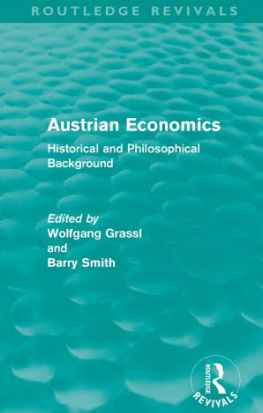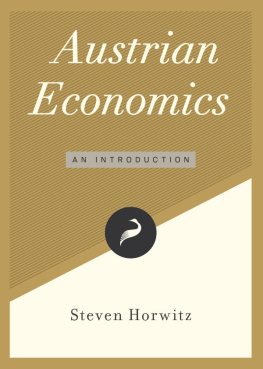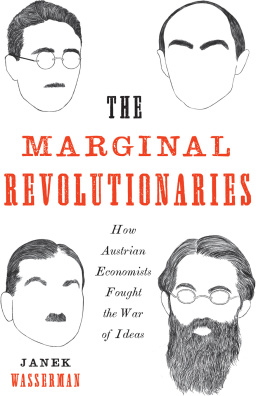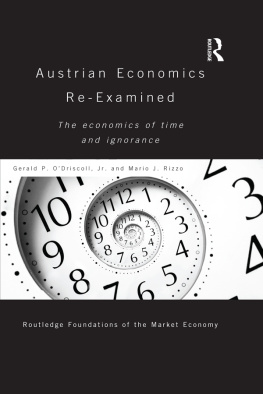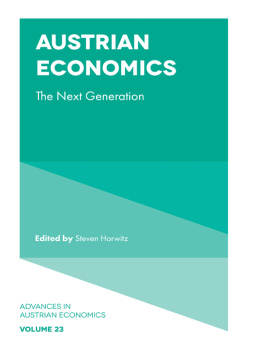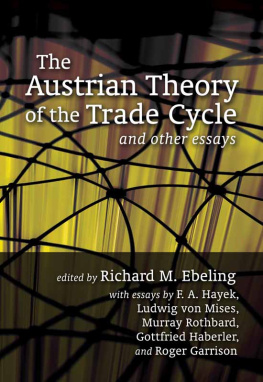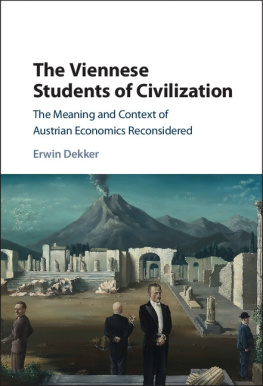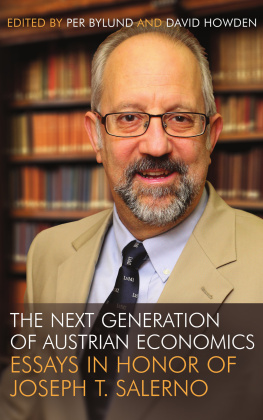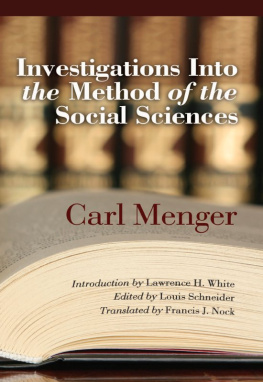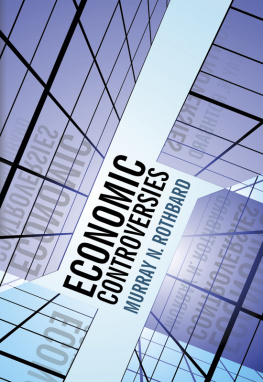
AUSTRIAN ECONOMICS: HISTORICAL AND PHILOSOPHICAL BACKGROUND
AUSTRIAN ECONOMICS
HISTORICAL AND PHILOSOPHICAL BACKGROUND
Edited by WOLFGANG GRASSL and BARRY SMITH
London & Sydney
1986 Wolfgang Grassl and Barry Smith
Croom Helm Ltd., Provident House, Burrell Row,
Beckenham, Kent BR3 1AT
This edition published in the Taylor & Francis e-Library, 2010.
To purchase your own copy of this or any of Taylor & Francis or Routledges collection of thousands of eBooks please go to www.eBookstore.tandf.co.uk.
Croom Helm Australia Pty Ltd, Suite 4, 6th Floor,
6476 Kippax Street, Surry Hills, NSW 2010, Australia
British Library Cataloguing in Publication Data
Austrian economics: historical and philosophical
background.
1. Austrian school of economics
I. Grassl, Wolfgang II. Smith, Barry
330.157 HB98
ISBN 0-203-83061-X Master e-book ISBN
ISBN 0-7099-3833-0
Copyright 2010 Mobipocket.com. All rights reserved.
Reader's Guide
This ebook has been optimized for MobiPocket PDA.
Tables may have been presented to accommodate this Device's Limitations.
Table content may have been removed due to this Device's Limitations.
Image presentation is limited by this Device's Screen resolution.
All possible language characters have been included within the Font handling ability of this Device.
CONTENTS
Barry Smith
Barry Smith
Reinhard FabianandPeter M.Simons
J.C.Nyri
Wolfgang Grassl
Roderick M.Chisholm
Rudolf Haller
Jeremy Shearmur
Ludwig M.Lachmann
PREFACE: AUSTRIAN ECONOMICS FROM MENGER TO HAYEK
Barry Smith
The Austrian school of economics has its beginnings in the publication, in 1871, of Carl Mengers Principles of Economics, a brilliant demonstration of the possibility of an economics which would be at one and the same time truly theoretical (exact) and also subjectivist. Thus the laws of the theory, laws of economic action and of economic value, are in every case related by Menger to individual utility, individual perception and individual decision in such a way as to embrace the recognition that all social phenomena are the result of human activity, all value the result of individual preference. An economy is not, from this subjectivist point of view, an autonomous formation with unintelligible properties of its own (it is not, for example, the circular flow that one finds represented in the standard textbooks). Rather, one can understand the workings of an economy. One can see, for example, how the value of goods at earlier stages in the productive process is in every case derived from the value to actual consumers of the products of the later stages.
The phrase Austrian school was at first employed as a term of denigration by opponents of Mengers ideas, above all by the members of the German historical school. For in contrast to its more developed neighbours to the west, Austria at that time could look back on almost no important theoretical or scientific achievements of her own. Moreover, Austrian intellectual life was still permeated by an underlying philosophy of Aristotelianism and scholastic realism, a philosophy which must have seemed, from the perspective of a forward-looking and enlightened Germany, with its Kant and its Hegel, merely quaint and old-fashioned. Paradoxically, however, it was at least in part this Aristotelian background which enabled Menger to make theoretical advances of a sort which were ruled out by the narrow inductivism of his German contemporaries. For Aristotle had insisted that there are qualities, for example, of action or knowledge or of more complex social phenomena, which are knowable a priori. Such phenomena thereby satisfy laws which do not stand in need of being inductively established. Menger was thus drawn to seek out such laws in the economic sphere, setting in train a tradition of research which can now be seen to have contributed much to our understanding both of the nature of the economic sphere and of the limits of economic theory.
The first-generation members of the Austrian school, Bhm-Bawerk and Wieser, were both, like Menger, professors of economics in Vienna, the latter in particular carrying forward Aristotelian ideas of the sort utilised earlier by Menger. Austrian economics then took part in that renaissance of intellectual and cultural life which is so characteristic of fin-de-sicle Austria. One can point, for example, to the names of Schumpeter, Mises, Mayer, Schnfeld-Illy, Rosenstein-Rodan, as well as to Austro-Marxists such as Hilferding and Otto Bauer who were also influenced by the thinking of Menger. It was above all, however, the circle of thinkers around Ludwig von Mises who did most to establish the characteristic methods and insights of the Austrian schoolparticularly in relation to the now increasingly influential Austrian theory of the trade circleand to spread the Austrian ideas beyond the borders of Austria herself. Mises circle included not only economists such as Hayek, Haberler, Machlup and Morgenstern, but also philosophers such as Felix Kaufmann and Alfred Schtz. Its influence is seen, for example, in the work of Lionel Robbins, but alsoand more radicallyin the philosophically challenging extreme subjectivism of G.L.S.Shackle.
Austrian economics in the present day is represented above all by Friedrich von Hayek, by Ludwig Lachmann, and by Israel Kirzner. Lachmann has perhaps done more than any other thinker within the Austrian tradition to push back the limits of subjectivism, particularly in relation to the role that is played by individual expectations in economic theory. Kirzner, who has developed and refined many of the ideas of Mises and Hayek on the role of knowledge and error in economic action, has shown how it is possible to utilise Misesian ideas on entrepreneurship in a way which has powerful consequences for economic theory in general and for our understanding of competition and the market in particular.
Competition, in the Austrian view, is never perfect. The plans and expectations of distinct market participants are never even approximately in harmony with one another. Yet there are manifest benefits of market competition, benefits of a sort which, as the early Austrians did much to demonstrate, would seem to be incapable of being simulated by, for example, a centrally planned economy. How, then, are such benefits to be understood? Classical economic theory has tackled this problem almost exclusively by examining the properties of the equilibrium statea state which involves perfect harmony of all participants plansand by demonstrating mathematically why this state, for givenfixedexternal conditions, is preferable to all others. Thus it has paid little attention to the problem of how the benefits of competition and of the market can be understood under the actually prevailing circumstances of endemic imperfection and of constantly changing external conditions. Austrian economists, in contrast, think not in terms of an ideal state of achieved equilibrium but rather in terms of a faltering process of always partial movement towards such an ideal state. Kirzner, in particular, has shown how it is the perception of disharmonies or of the mismatchings of plans on the part of individual entrepreneurs that serves as the motor giving rise to a tendency towards relatively greater harmony, and thereby to the realisation of economic opportunities hitherto unexploited. But now the entrepreneurs task, in a view of this sort, is not, as in the classical (Robbinsian) view, one of
Next page
